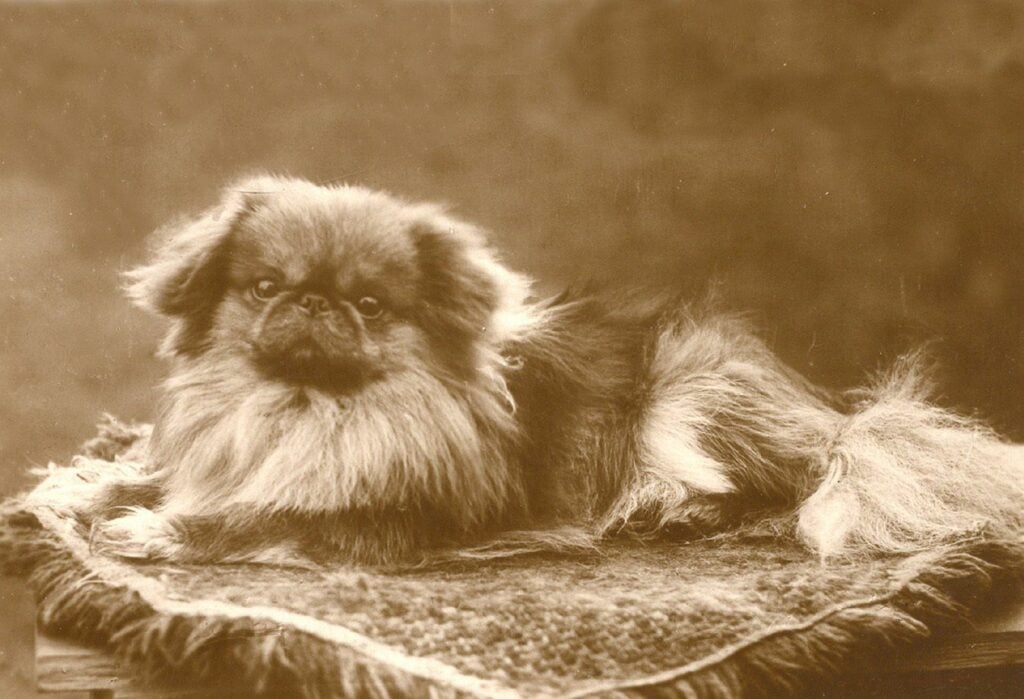The Opium Wars of the mid-nineteenth century were a watershed moment in modern Chinese history. From 1839 to 1842, China and the United Kingdom fought the first Opium War. From 1856 to 1860, a weakened China fought Great Britain and France in the Second Opium War. China was defeated in both wars. The terms of its defeat were bitter: China had to cede Hong Kong territory to British control, open treaty ports to foreign trade, and grant special rights to foreigners operating within the treaty ports. But did you know that the soldiers brought home a gift to Queen Victoria?
During the end-of-the-second-opium-war looting of the Chinese imperial palace, British soldiers stole a Pekingese dog to give to Queen Victoria. She dubbed it “Looty.”
How Did Looty End Up with Queen Victoria?
During the Second Opium War, Indian, British, and French troops invaded Beijing and looted the Old Summer Palace’s treasures, which are now on display in museums around the world. They set fire to the entire palace after looting it. The fire was said to have lasted three days and nights. Almost all of the buildings were destroyed by fire. Only crumbling marble structures remained. Yuanmingyuan’s splendour and magnificence vanished in this fire.
According to UNESCO, there are approximately 1.64 million Chinese antiques on display in 200 museums in 47 foreign countries as a result of the looting.
The prized Pekingese dogs, the proud possession of the Chinese aristocracy, were an unlikely loot that the marauders obtained. When Emperor Xian Feng fled to Chengde with his entire court, an elderly aunt of the emperor could not be taken and had to be left behind. She committed suicide when Indian, British, and French troops stormed the palace quarters. She was discovered mourning with her five Pekingese dogs.
These prized toy dogs were rescued and later shipped to England. In April 1861, Captain Dunne of the 99th Regiment presented the exotic Pekingese to Queen Victoria of Great Britain, who appropriately named it ‘Looty.’
Looty was regarded as the country’s smallest and most beautiful dog. (Source: Mangalore Today)
The Beautiful Pekingese Dog
Lord John Hay took a pair of the remaining toy-dogs, later named Schloff and Hytien, and gave them to his sister, the Duchess of Wellington, wife of Henry Wellesley, 3rd Duke of Wellington. Sir George Fitzroy took another pair and gave them to the Duke and Duchess of Richmond and Gordon, his cousins.
The Pekingese, also known as the Lion-Dog, Pekingese Lion-Dog, Pelchie Dog, or Peke, is an ancient Chinese toy dog breed. Lion-Dogs are so named because they resemble Chinese guardian lions. The breed was popular among Chinese royalty as a lap dog and companion dog, and its name refers to the city of Peking, which is now Beijing.
A romanticized description of the Pekingese can be found in a long-form poem titled “Pearls Dropped from the Lips of Her Imperial Majesty Tzu-Hsi Dowager Empress of the Flowery Land.” The dowager empress bred Pekingese as well as Pugs and Shih Tzu in her royal kennel.
People say it is the most perfect little beauty they have ever seen
Captain John Hart Dunne
(Source: Mangalore Today)
